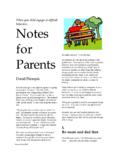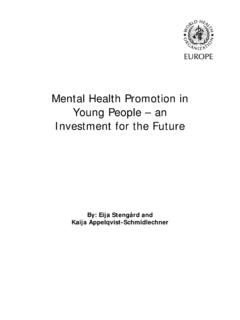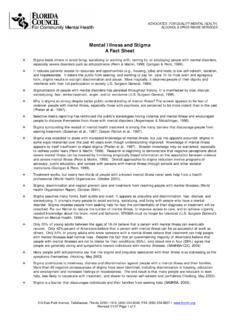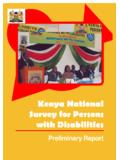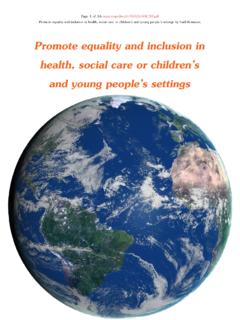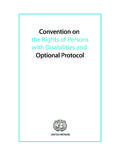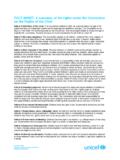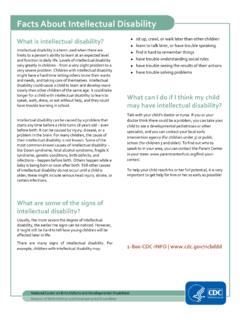Transcription of Parents with Disabilities and their Children
1 Parents with Disabilities and their Children : Promoting Inclusion and Awareness in the Classroom A guide for Classroom Teachers Grades 1-6 Through the Looking Glass, The National Center for Parents with Disabilities and their Families Parents with Disabilities and their Children : Promoting Inclusion and Awareness in the Classroom A guide for Classroom Teachers Grades 1-6 Through the Looking Glass 3075 Adeline Street, Suite 120 Berkeley, CA 94703 Toll-Free within the (800) 644-2666 Local/International (510) 848-1112 TTY: (510) 848-1005 FAX: (510) 848-4445 email: website: Through the Looking Glass, 2013 Page 3 of 26 Table of Contents Introduction .. 4 Terminology: What s the Right Word? .. 5 Do Any of the Students at your School Have Parents with Disabilities ?
2 7 What Is My School s Responsibility to Accommodate Parents with Disabilities ? .. 9 Suggestions for Accommodating Parents with Diverse Disabilities .. 11 Involving Parents with Disabilities in the Classroom .. 16 Classroom Activities to Promote Awareness about Parents with Disabilities .. 18 Suggested Books for Young Readers about Parents with Disabilities .. 20 Articles or Books for Adults regarding Parents with Disabilities .. 23 Acknowledgements .. 25 Page 4 of 26 Introduction In the , there are at least 4 million Parents with significant Disabilities who are raising Children under age 18. This includes Parents who have a physical disability, Parents who are deaf, Parents who are blind, Parents with chronic illnesses, Parents who have an intellectual disability and Parents who have a psychiatric disability.
3 Although there are millions of Parents with Disabilities in the , these Parents are often left out of the picture invisible to the general public and even in their home communities. Classroom teachers and school officials can make a major and lifelong impact in how Parents with Disabilities are included in their Children s education. This guide offers suggestions to include Parents with Disabilities in your school as well as classroom activities. Through the Looking Glass is a nonprofit organization serving families with Disabilities . We are also The National Center for Parents with Disabilities and their Families. Over the past 30 years, we ve trained and provided services to over 100,000 consumers and professionals to create more awareness about and better resources for the millions of Parents with Disabilities in the One of the guiding principles at Through the Looking Glass is to provide disability-appropriate services and support to the very diverse population of those with Disabilities .
4 This means taking into account the specific nature of the disability that a parent may have as well as the parent s language, ethnic and cultural background, the age of their Children and individual preferences. For Parents with Disabilities and their families, one size does not fit all. What works for one family may not work for another family even though both Parents may appear to have the exact same disability. We welcome your feedback as well as ideas and suggestions for other teachers and school personnel. Also, as part of our National Center, we can offer trainings and consultations to Parents , family members and other professionals concerning Parents with Disabilities and their families If you have specific suggestions or activities for other teachers to increase awareness and participation of Parents with Disabilities at your school, please send them to us so we can post these ideas on our website as well as include this in future publications.
5 Suggestions can be anonymous or can be credited to you and your school depending on your preference. Page 5 of 26 Terminology: What s the Right Word? There are many different perspectives on what it means to have a disability. Some people may not use this term at all. For example, many deaf people do not say they have a disability, but rather are deaf. People with short stature may refer to themselves as little people. People often worry about using the right word or phrase when talking about people with Disabilities . In this case, Parents with Disabilities . Why not say disabled parent rather than parent with a disability ? Not everyone agrees which one is the preferred term. For some people, neither term is preferable.
6 Although some of the explanations below may be too complicated for younger Children , nevertheless, as a classroom teacher you can help shape the language that they use when talking about Parents with Disabilities . It isn t so much about correcting Children for using the wrong word, but to have them understand that each of us may have a particular label that we like or don t like. Feeling awkward or uncomfortable because you aren t sure which is the right word isn t limited just to people with Disabilities . It can happen around using the right words for a person s gender, race, ethnicity and other groups of people as well. The important part is to check with the person or people involved -- find out what they prefer. But, also continue to monitor the words we use to describe other people -- knowing that we all have different preferences and ideas about what s right.
7 The most important part is to be open and willing to talk about it. Below are some suggestions for how to talk about Parents with Disabilities : Parent with a disability Parent who has a disability This word order emphasizes the parent first who also happens to have a disability. This phrase is preferred by many, but not all. Related terms that use this word order include: a parent who is blind; a parent who uses a wheelchair; parent who has a physical disability. Disabled parent This word order takes the opposite view that is, being disabled is very much a part of who the person is. For some, being disabled is very much a part of their identity and is something to be proud of -- even if some people have negative ideas about what being disabled means.
8 Others, however, feel that being labeled disabled first undermines the sense that the person is more than just their disability. Related terms that use this word order include: blind parent; deaf parent; physically disabled parent. I m not disabled. I don t have a disability. There are other words that some people prefer instead of disabled or disability no matter what the word order is. For example, many culturally Deaf people do not consider themselves disabled but merely Deaf. Similarly, other groups prefer using specific Page 6 of 26 terms for their condition such as blind or little person or being a diabetic rather than being labeled as being disabled. Handicapped Impaired Challenged Most people with Disabilities find the term handicapped to be offensive because the word emphasizes a person s limitation.
9 Historically the word handicapped was often used to portray someone who is incapable and needs a great deal of help. Similarly the word impaired also has a negative connotation that emphasizes the person s limitation ( , hearing-impaired, visually-impaired, person with a physical impairment ). Another term that is usually considered awkward and somewhat negative is challenged ( , physically-challenged, visually-challenged). Intellectual Disability Among the many changes in preferred words, perhaps the most notable are terms that were used to describe someone who was previously labeled mentally retarded. That term is no longer used and is considered offensive, along with terms like slow or retard. Other terms that were used in the past like developmentally delayed or dd are also not used.
10 The preferred term is someone who has an intellectual disability. Deaf Parent Many Parents who have a significant hearing loss identify themselves as a Deaf parent (note the Capital D) rather than a parent with a disability. These Parents use American Sign Language and actively participate in the Deaf Community. They consider themselves culturally Deaf (not just having a hearing loss). Culturally Deaf Parents do not typically want to be labeled as having a disability. Also, note that approximately 90% of the Children of Deaf Parents will be hearing. Many of these hearing Children are bilingual (using spoken English and American Sign Language) and, like their Parents , can also be considered culturally Deaf. Other terms to use or not use People with Disabilities do not want to be called or considered abnormal so avoid referring to people without Disabilities as normal.
